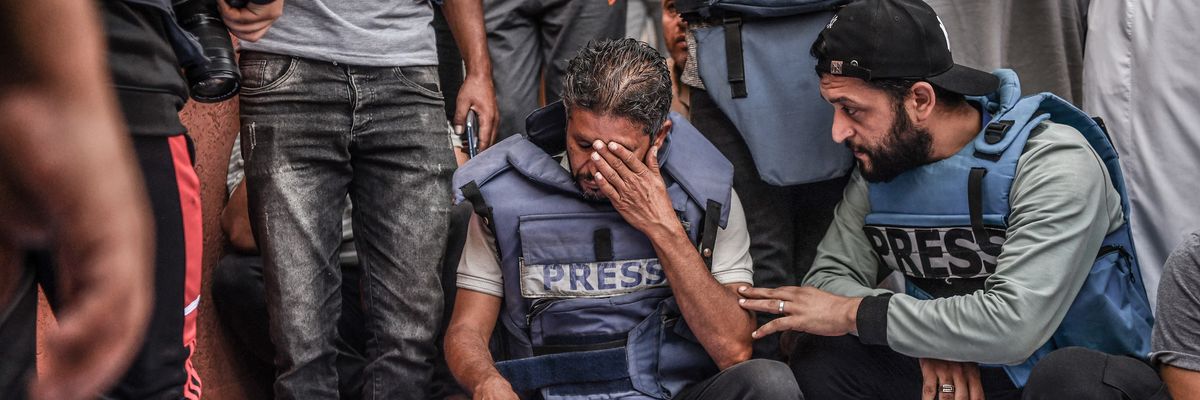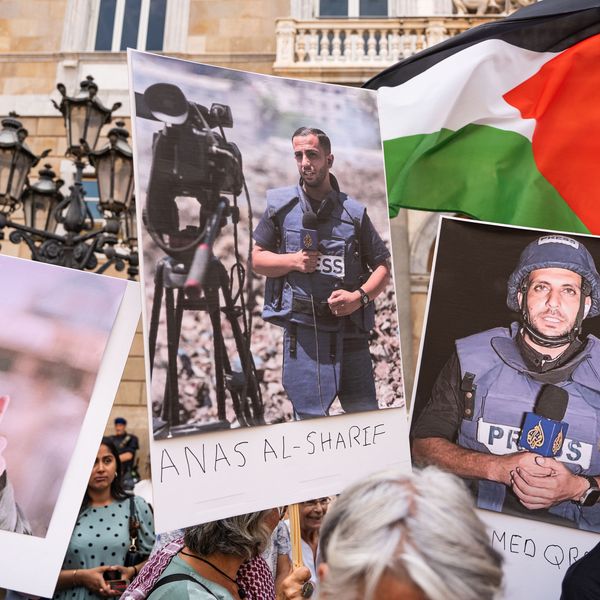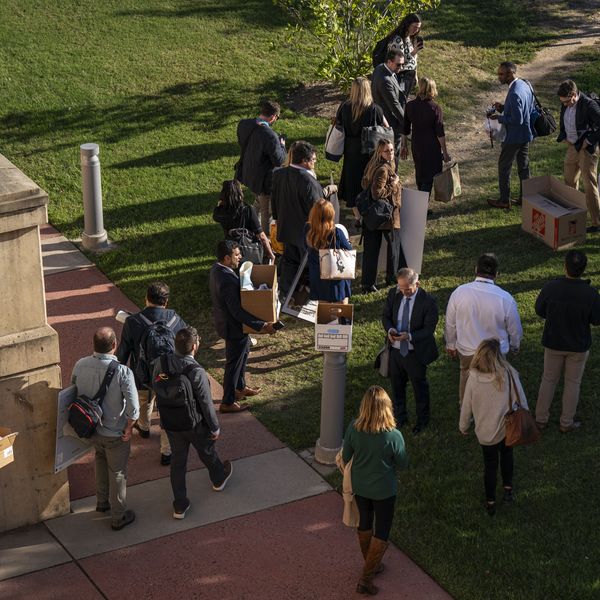
A funeral ceremony is held for Palestine TV correspondent Mohammed Abu Hatab, who was killed, along with his family members, in an Israeli airstrike on his home in Khan Yunis, Gaza on November 03, 2023.
Press Freedom Group Slams Tom Cotton for Boosting 'Malicious Disinformation' About Gaza Journalists
The U.S. senator and top Israeli officials have "put journalists' lives at risk" by seizing on a baseless report, the Freedom of the Press Foundation said.
A U.S.-based press freedom group slammed Republican Sen. Tom Cotton and top Israeli officials on Friday for uncritically boosting a report that falsely suggested Gaza-based photojournalists who were on the scene during Hamas' deadly attack on southern Israel last month were in some way complicit in the assault.
The report, published on November 8 by the Israeli media watchdog HonestReporting, stated that "judging from the pictures of lynching, kidnapping, and storming of an Israeli kibbutz, it seems like the border has been breached not only physically, but also journalistically."
But the watchdog's executive director, a former reporter for The Jerusalem Post, has since admitted that the group had no evidence indicating that Gaza-based photojournalists working freelance for The New York Times, The Associated Press, and other outlets "coordinated with Hamas" ahead of the October 7 attack.
"They were legitimate questions to be asked," HonestReporting's Gil Hoffman said in an interview with the AP, adding that "we don't claim to be a news organization."
Hoffman told the AP that he was satisfied with journalists' explanations that they had no prior knowledge of the attack, but the Freedom of the Press Foundation warned Friday that "the potentially lethal damage has already been done."
While the Times, AP, and other news outlets mentioned in the HonestReporting analysis denied the group's insinuations about journalists' prior knowledge and coordination with Hamas, prominent politicians—including Cotton (Ark.) in the U.S. and Israeli Prime Minister Benjamin Netanyahu—rushed to amplify the baseless allegations.
"Cotton, a man with so much irrational hatred for the free press that he must have something awful to hide from it, sent a letter to the DOJ calling for an investigation of whether The Associated Press, CNN, The New York Times, and Reuters 'committed federal crimes by supporting Hamas terrorists,'" Seth Stern, director of advocacy at the Freedom of the Press Foundation, wrote Friday.
Cotton also
sent letters to the Times and other outlets demanding that they "answer what they knew about their employees accompanying Hamas during the October 7 attack." The Times' senior vice president and deputy general counsel replied that the Arkansas senator was "merely parroting disinformation harvested from the Internet based on a website that has conceded it had no evidence for its claims."
In addition to Cotton, Stern noted, Netanyahu used "the spurious report to call the photojournalists 'accomplices in crimes against humanity' and condemn the media outlets that published their work."
"Others went even further. Former Israeli Minister of Defense Benny Gantz said journalists who photographed the attack 'are no different than terrorists and should be treated as such,'" Stern wrote. "Danny Danon, a member of Israel's parliament and its former representative to the United Nations, said on X, formerly Twitter, that Israel's internal security agency would add the photojournalists named in HonestReporting's report to its kill list."
"It's a virtual certainty that their irresponsible speculation will be cited to justify past and future violence against the press. They've put journalists' lives at risk."
As AP reported Thursday, the Times said in response to HonestReporting that "Yousef Masoud, whose photographs of an Israeli tank captured by Hamas were used by the newspaper and AP, did not know" about the Hamas attack in advance.
"His first photographs that day were filed 90 minutes after the attack began," AP observed. "Reuters used pictures credited to Mohammed Fayq Abu Mostafa and Yasser Qudih, two freelancers it had no prior relationship with. Its first photo was published more than 45 minutes after Israel said gunmen had crossed the border, the news agency said."
In a statement on Friday, Stern said that "it's absolutely reckless for a group calling itself 'HonestReporting' to insinuate that photojournalists who take pictures of atrocities are complicit in them."
"Despite HonestReporting's recent backpedaling, it's a virtual certainty that their irresponsible speculation will be cited to justify past and future violence against the press. They've put journalists' lives at risk," Stern added. "Photojournalists risk their lives to document history. It's absurd to suggest that photographing atrocities, or failing to somehow disarm gunmen with their news cameras, proves they're somehow collaborating with terrorists. And it's equally preposterous to suggest, as Sen. Cotton has, that U.S. news outlets are responsible for hypothetical misconduct by any freelancer overseas from whom they buy a photograph."
According to the latest tally from the Committee to Protect Journalists (CPJ), at least 40 media workers have been killed in Gaza, Israel, and Lebanon since October 7. Thirty-five of the journalists killed thus far were Palestinian.
CPJ has also documented the arrests of 13 journalists and "multiple assaults, threats, cyberattacks, censorship, and killings of family members."
The Middle East desk of Reporters Without Borders said Friday that in the wake of HonestReporting's false misinformation, "Israeli authorities have gone from claims that they cannot guarantee the protection of journalists in Gaza to death threats against reporters covering the conflict based on suspicions that are so far unsupported by arguments or evidence."
"Statements discrediting the integrity of an entire profession on this basis are unacceptable," the group said. "They condone and incite the persecution of those who are risking their lives to report the news. We condemn these statements and reiterate that targeting journalists who cover conflicts is a war crime."
An Urgent Message From Our Co-Founder
Dear Common Dreams reader, The U.S. is on a fast track to authoritarianism like nothing I've ever seen. Meanwhile, corporate news outlets are utterly capitulating to Trump, twisting their coverage to avoid drawing his ire while lining up to stuff cash in his pockets. That's why I believe that Common Dreams is doing the best and most consequential reporting that we've ever done. Our small but mighty team is a progressive reporting powerhouse, covering the news every day that the corporate media never will. Our mission has always been simple: To inform. To inspire. And to ignite change for the common good. Now here's the key piece that I want all our readers to understand: None of this would be possible without your financial support. That's not just some fundraising cliche. It's the absolute and literal truth. We don't accept corporate advertising and never will. We don't have a paywall because we don't think people should be blocked from critical news based on their ability to pay. Everything we do is funded by the donations of readers like you. Will you donate now to help power the nonprofit, independent reporting of Common Dreams? Thank you for being a vital member of our community. Together, we can keep independent journalism alive when it’s needed most. - Craig Brown, Co-founder |
A U.S.-based press freedom group slammed Republican Sen. Tom Cotton and top Israeli officials on Friday for uncritically boosting a report that falsely suggested Gaza-based photojournalists who were on the scene during Hamas' deadly attack on southern Israel last month were in some way complicit in the assault.
The report, published on November 8 by the Israeli media watchdog HonestReporting, stated that "judging from the pictures of lynching, kidnapping, and storming of an Israeli kibbutz, it seems like the border has been breached not only physically, but also journalistically."
But the watchdog's executive director, a former reporter for The Jerusalem Post, has since admitted that the group had no evidence indicating that Gaza-based photojournalists working freelance for The New York Times, The Associated Press, and other outlets "coordinated with Hamas" ahead of the October 7 attack.
"They were legitimate questions to be asked," HonestReporting's Gil Hoffman said in an interview with the AP, adding that "we don't claim to be a news organization."
Hoffman told the AP that he was satisfied with journalists' explanations that they had no prior knowledge of the attack, but the Freedom of the Press Foundation warned Friday that "the potentially lethal damage has already been done."
While the Times, AP, and other news outlets mentioned in the HonestReporting analysis denied the group's insinuations about journalists' prior knowledge and coordination with Hamas, prominent politicians—including Cotton (Ark.) in the U.S. and Israeli Prime Minister Benjamin Netanyahu—rushed to amplify the baseless allegations.
"Cotton, a man with so much irrational hatred for the free press that he must have something awful to hide from it, sent a letter to the DOJ calling for an investigation of whether The Associated Press, CNN, The New York Times, and Reuters 'committed federal crimes by supporting Hamas terrorists,'" Seth Stern, director of advocacy at the Freedom of the Press Foundation, wrote Friday.
Cotton also
sent letters to the Times and other outlets demanding that they "answer what they knew about their employees accompanying Hamas during the October 7 attack." The Times' senior vice president and deputy general counsel replied that the Arkansas senator was "merely parroting disinformation harvested from the Internet based on a website that has conceded it had no evidence for its claims."
In addition to Cotton, Stern noted, Netanyahu used "the spurious report to call the photojournalists 'accomplices in crimes against humanity' and condemn the media outlets that published their work."
"Others went even further. Former Israeli Minister of Defense Benny Gantz said journalists who photographed the attack 'are no different than terrorists and should be treated as such,'" Stern wrote. "Danny Danon, a member of Israel's parliament and its former representative to the United Nations, said on X, formerly Twitter, that Israel's internal security agency would add the photojournalists named in HonestReporting's report to its kill list."
"It's a virtual certainty that their irresponsible speculation will be cited to justify past and future violence against the press. They've put journalists' lives at risk."
As AP reported Thursday, the Times said in response to HonestReporting that "Yousef Masoud, whose photographs of an Israeli tank captured by Hamas were used by the newspaper and AP, did not know" about the Hamas attack in advance.
"His first photographs that day were filed 90 minutes after the attack began," AP observed. "Reuters used pictures credited to Mohammed Fayq Abu Mostafa and Yasser Qudih, two freelancers it had no prior relationship with. Its first photo was published more than 45 minutes after Israel said gunmen had crossed the border, the news agency said."
In a statement on Friday, Stern said that "it's absolutely reckless for a group calling itself 'HonestReporting' to insinuate that photojournalists who take pictures of atrocities are complicit in them."
"Despite HonestReporting's recent backpedaling, it's a virtual certainty that their irresponsible speculation will be cited to justify past and future violence against the press. They've put journalists' lives at risk," Stern added. "Photojournalists risk their lives to document history. It's absurd to suggest that photographing atrocities, or failing to somehow disarm gunmen with their news cameras, proves they're somehow collaborating with terrorists. And it's equally preposterous to suggest, as Sen. Cotton has, that U.S. news outlets are responsible for hypothetical misconduct by any freelancer overseas from whom they buy a photograph."
According to the latest tally from the Committee to Protect Journalists (CPJ), at least 40 media workers have been killed in Gaza, Israel, and Lebanon since October 7. Thirty-five of the journalists killed thus far were Palestinian.
CPJ has also documented the arrests of 13 journalists and "multiple assaults, threats, cyberattacks, censorship, and killings of family members."
The Middle East desk of Reporters Without Borders said Friday that in the wake of HonestReporting's false misinformation, "Israeli authorities have gone from claims that they cannot guarantee the protection of journalists in Gaza to death threats against reporters covering the conflict based on suspicions that are so far unsupported by arguments or evidence."
"Statements discrediting the integrity of an entire profession on this basis are unacceptable," the group said. "They condone and incite the persecution of those who are risking their lives to report the news. We condemn these statements and reiterate that targeting journalists who cover conflicts is a war crime."
A U.S.-based press freedom group slammed Republican Sen. Tom Cotton and top Israeli officials on Friday for uncritically boosting a report that falsely suggested Gaza-based photojournalists who were on the scene during Hamas' deadly attack on southern Israel last month were in some way complicit in the assault.
The report, published on November 8 by the Israeli media watchdog HonestReporting, stated that "judging from the pictures of lynching, kidnapping, and storming of an Israeli kibbutz, it seems like the border has been breached not only physically, but also journalistically."
But the watchdog's executive director, a former reporter for The Jerusalem Post, has since admitted that the group had no evidence indicating that Gaza-based photojournalists working freelance for The New York Times, The Associated Press, and other outlets "coordinated with Hamas" ahead of the October 7 attack.
"They were legitimate questions to be asked," HonestReporting's Gil Hoffman said in an interview with the AP, adding that "we don't claim to be a news organization."
Hoffman told the AP that he was satisfied with journalists' explanations that they had no prior knowledge of the attack, but the Freedom of the Press Foundation warned Friday that "the potentially lethal damage has already been done."
While the Times, AP, and other news outlets mentioned in the HonestReporting analysis denied the group's insinuations about journalists' prior knowledge and coordination with Hamas, prominent politicians—including Cotton (Ark.) in the U.S. and Israeli Prime Minister Benjamin Netanyahu—rushed to amplify the baseless allegations.
"Cotton, a man with so much irrational hatred for the free press that he must have something awful to hide from it, sent a letter to the DOJ calling for an investigation of whether The Associated Press, CNN, The New York Times, and Reuters 'committed federal crimes by supporting Hamas terrorists,'" Seth Stern, director of advocacy at the Freedom of the Press Foundation, wrote Friday.
Cotton also
sent letters to the Times and other outlets demanding that they "answer what they knew about their employees accompanying Hamas during the October 7 attack." The Times' senior vice president and deputy general counsel replied that the Arkansas senator was "merely parroting disinformation harvested from the Internet based on a website that has conceded it had no evidence for its claims."
In addition to Cotton, Stern noted, Netanyahu used "the spurious report to call the photojournalists 'accomplices in crimes against humanity' and condemn the media outlets that published their work."
"Others went even further. Former Israeli Minister of Defense Benny Gantz said journalists who photographed the attack 'are no different than terrorists and should be treated as such,'" Stern wrote. "Danny Danon, a member of Israel's parliament and its former representative to the United Nations, said on X, formerly Twitter, that Israel's internal security agency would add the photojournalists named in HonestReporting's report to its kill list."
"It's a virtual certainty that their irresponsible speculation will be cited to justify past and future violence against the press. They've put journalists' lives at risk."
As AP reported Thursday, the Times said in response to HonestReporting that "Yousef Masoud, whose photographs of an Israeli tank captured by Hamas were used by the newspaper and AP, did not know" about the Hamas attack in advance.
"His first photographs that day were filed 90 minutes after the attack began," AP observed. "Reuters used pictures credited to Mohammed Fayq Abu Mostafa and Yasser Qudih, two freelancers it had no prior relationship with. Its first photo was published more than 45 minutes after Israel said gunmen had crossed the border, the news agency said."
In a statement on Friday, Stern said that "it's absolutely reckless for a group calling itself 'HonestReporting' to insinuate that photojournalists who take pictures of atrocities are complicit in them."
"Despite HonestReporting's recent backpedaling, it's a virtual certainty that their irresponsible speculation will be cited to justify past and future violence against the press. They've put journalists' lives at risk," Stern added. "Photojournalists risk their lives to document history. It's absurd to suggest that photographing atrocities, or failing to somehow disarm gunmen with their news cameras, proves they're somehow collaborating with terrorists. And it's equally preposterous to suggest, as Sen. Cotton has, that U.S. news outlets are responsible for hypothetical misconduct by any freelancer overseas from whom they buy a photograph."
According to the latest tally from the Committee to Protect Journalists (CPJ), at least 40 media workers have been killed in Gaza, Israel, and Lebanon since October 7. Thirty-five of the journalists killed thus far were Palestinian.
CPJ has also documented the arrests of 13 journalists and "multiple assaults, threats, cyberattacks, censorship, and killings of family members."
The Middle East desk of Reporters Without Borders said Friday that in the wake of HonestReporting's false misinformation, "Israeli authorities have gone from claims that they cannot guarantee the protection of journalists in Gaza to death threats against reporters covering the conflict based on suspicions that are so far unsupported by arguments or evidence."
"Statements discrediting the integrity of an entire profession on this basis are unacceptable," the group said. "They condone and incite the persecution of those who are risking their lives to report the news. We condemn these statements and reiterate that targeting journalists who cover conflicts is a war crime."

